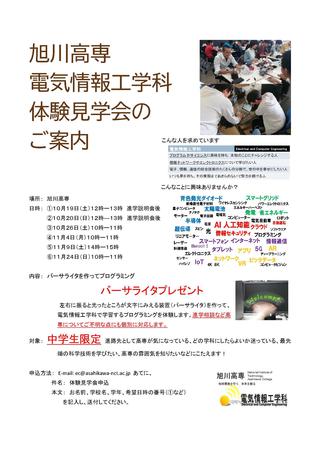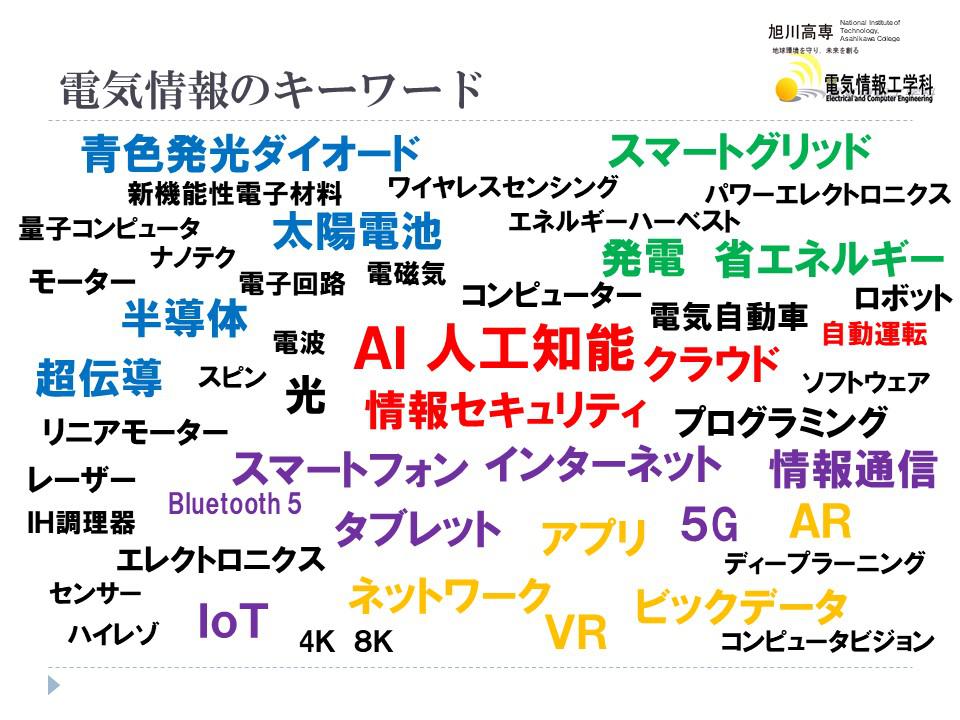Department of Electrical and Information Engineering
Learn the knowledge and technology of "electricity" and "computers and information" for a new era centered on artificial intelligence (AI), and nurture human resources who can utilize them.
Notice to junior high school students
As one of the course choices, we will hold an experience tour to learn more about the Department of Electrical and Computer Engineering at Asahikawa National College of Technology. The dates are 10/19, 10/20, 10/26, 11/4, 11/9 and 11/24. Click on the image below for details.

Electrical and Information Engineering Department
The environment surrounding us is about to change dramatically due to the rapid development of artificial intelligence (AI). In the future, electronic devices equipped with AI will be used on a daily basis, and there is no doubt that the demand for electricity supply (power generation) will increase with information networks, new communication methods, advanced smartphones and electronics.
For example, smartphones around us are powered by electricity, with small computers inside due to the development of semiconductor technology. In addition, wireless electronic components are used to connect to the Internet, and "information" on computers is exchanged via communication networks.




In the Department of Electrical and Information Engineering at Asahikawa National College of Technology, we conduct learning that leads to the following keywords. Focusing on AI (Artificial Intelligence),semiconductorrelation on the upper left,power energyrelation on the upper right,IoT/communication networkon the lower left The contents of what you learn in the College of Electrical and Information Engineering, including theprogramming and data sciencerelations on the lower right side, are connected to a wide variety of the latest technologies. I don't wear metal in work clothes or mix chemicals in white coats, but I spend a lot of time studying how electricity flows, how computers work, and programming. For that reason, it is also characterized by the longest programming class time among the four departments.

In the Department of Electrical and Computer Engineering, you can learn the "electricity" and "information" that are needed in the new era. Most phenomena related to electricity are invisible and may take some time to understand intuitively. But it's okay to focus on experiments and practical training while learning gradually. First-year to third-year students study the basics of electricity, electronics, and computers (information). After 4 or 5 years, I will study more advanced electrical, electronic and information engineering fields.
Educational goals and curriculum composition policy
Schedule and syllabus
Graduation research list
In his graduation research in the fifth grade, he stated, "We have creativity and flexible thinking skills based on our expertise in electrical, electronic and information engineering, and have a global perspective and information in an internationalized society. Cultivating engineers who can find useful morals and communication skills in a changing society. " In fiscal 2016, graduation research was promoted under the following themes.
- Detection of body parts for AR clothing
- Production of environmental measurement device using Arduino
- Proposal for improvement of beginner's teaching materials for 3DCG movie production using MMD
- Crystal growth of Nb-doped SrTiO3 thin films by PLD method using Nd: YAG laser
- Creating information security materials using Raspberry Pi
- Development of monitoring system using RaspberryPi
- Study on estimation accuracy in Root-MUSIC method
- Preparation of Ta-N thin film and evaluation of its film quality
- Basic research on collaborative work using VR
- ZrN thin film preparation and electrode application
- Gaze detection by optical flow
- A Study on Campus Power Demand Prediction Technology
- Game-based treatment for Alzheimer's disease
- Small fuel cell prototype and characteristics evaluation
- Automatic driving by depth image analysis
- Development and evaluation of recording system using binaural recording
- Development of traffic statistics tool using bus open data
- Network construction of multiple devices using microcomputer
- Optimization of catalyst shape in microwave heating
- Study of Parkinson's disease rehabilitation support device using one-board microcomputer
- A Study on Animal Behavior Prediction Method Using Machine Learning
- A Study on Estimation of Arrival Waves in Near Source
- Identifying vegetable images by comparing spatial features
- Research on automatic antenna design using optimization techniques
- Study of magnetic property evaluation method
- Manufacture of dye-sensitized solar cell and improvement of FF
- Desktop Object Recognition Method Using Deep Learning
- Real-time 3D modeling using multiple cameras
- Pedestrian dangerous posture detection
- Development of a visualization support system for statistical data in Hokkaido
- Development of a new motion detection system using wireless communication
Department in charge: Department of Electrical and Information Engineering